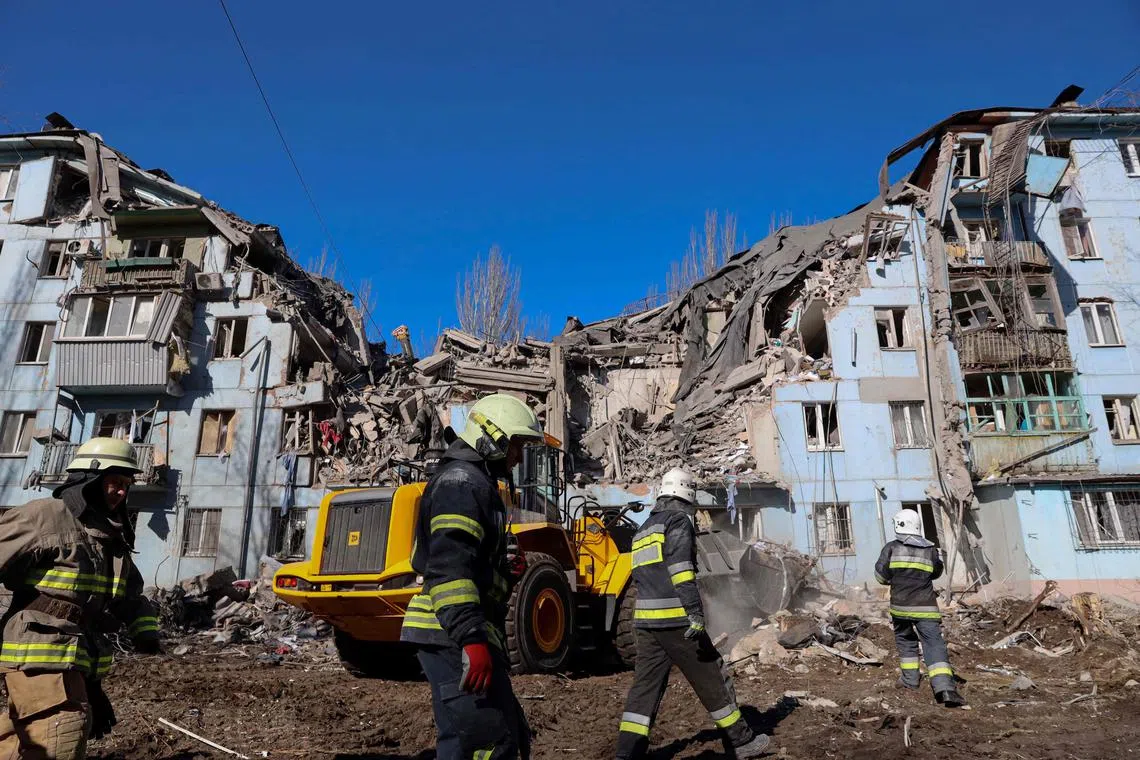China joins Russia in refusing to agree to G-20 statement condemning Putin’s war in Ukraine
Sign up now: Get ST's newsletters delivered to your inbox

A photo from March 2, 2023, shows a building destroyed by a missile strike in Zaporizhzhia, Ukraine.
PHOTO: AFP
NEW DELHI – China and Russia have refused to join other Group of 20 (G-20) nations in a statement in which most members are condemning Russian President Vladimir Putin’s war in Ukraine, showing divisions remain entrenched on how to end a conflict that has roiled the global economy.
“Given the state of polarisation around Ukraine, a consensus could not be reached,” top Indian diplomat Subrahmanyam Jaishankar told reporters after a meeting of G-20 foreign ministers in New Delhi on Thursday.
“There are occasions when you don’t have an agreement among G-20 countries,” he said.
India later issued a chairman’s statement that confirmed Russia and China did not agree to language that G-20 leaders negotiated in Bali, Indonesia, only four months ago.
It said “most members strongly condemned the war in Ukraine, and stressed it is causing immense human suffering” through inflation, food security and other risks.
A similar meeting of G-20 finance ministers and central bank heads on the weekend also failed to reach a consensus on wording, forcing India as host to issue a chair’s summary instead of a joint communique.
The lack of consensus raises questions over whether Prime Minister Narendra Modi can bridge the divide in time for a leaders’ summit in September.
Much depends on the state of United States-China relations, which have spiralled in the wake of a positive meeting between US President Joe Biden and Chinese leader Xi Jinping in November.
The US downing of an alleged Chinese spy balloon led to the postponement of a trip by Secretary of State Antony Blinken to Beijing, which sparked a new round of tit-for-tat recriminations by the world’s biggest economies.
In India on Thursday, Mr Blinken pressed his Russian counterpart Sergei Lavrov
“I told the Foreign Minister what I and so many others said last week at the United Nations, and what so many G-20 foreign ministers said today: End this war of aggression, engage in meaningful diplomacy that can produce a just and durable peace,” Mr Blinken told reporters, referring to a UN vote condemning Russia’s invasion.
The circumstances of the meeting were unclear.
During a stop in Tashkent, Uzbekistan, on Wednesday, Mr Blinken said he had no plans to meet Mr Lavrov or Chinese Foreign Minister Qin Gang at the G-20.
Yet, Russian Foreign Ministry spokesman Maria Zakharova said Mr Blinken approached Mr Lavrov and “we didn’t push him away”.
Mr Lavrov “disregarded in his usual manner” what Mr Blinken told him, Ms Zakharova said in dismissive comments on state television. “It doesn’t deserve our attention. There was nothing interesting.”
Earlier on Thursday, China emphasised the need for G-20 diplomats to build off a consensus at the November summit in Bali, signalling an effort to move past divisions over the conflict.
“We should build on our good work in Bali and press ahead for greater progress,” Mr Qin said. BLOOMBERG


